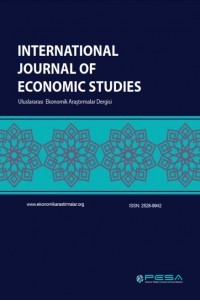Emek Payının Hesaplanması:Farklı Yaklaşımlar, Farklı Paradigmalar
Emek Payı, Emek Piyasası, Gelir Dağılımı
___
- Atiyas, İ. (2009), “Recent Privatization Experience of Turkey: A Reappraisal”, Turkey and the Global Economy: Neo-liberal Restructuring and Integration in the Post-Crisis Era, içinde Ziya Öniş ve Fikret Şenses (eds.), s. 101-123, London, New York: Routledge.
- Atkinson, A. (1975), The Economics of Inequality, Oxford: Clarendon Press.
- Atkinson, A. (2009), “Factor shares: the principal problem of political economy?”, Oxford Review of Economic Policy, Cilt: 25, Sayı: 1, s. 3-16.
- Bentolila, S. ve Saint-Paul, G. (2003), “Explaining Movements in the Labor Share”, Contributions in Macroeconomics, Cilt: 3, Sayı: 1.
- Blanchard, O. ve Giavazzi, F. (2001), “Macroeconomic Effects of Regulation and Deregulation in Goods and Labor Markets”, National Bureau of Economic Research, NBER Working Paper Series No: 8120, February.
- Blaug, M. (1996), Economic Theory in Retrospect, 5. Baskı, Cambridge: Cambridge University Press.
- Daudey, E. ve Garcia-Penalosa, C. (2007), “The personal and the factor distributions of income in a cross-section of countries”, The Journal of Development Studies,Cilt: 43, Sayı: 5, s. 812-829.
- Diwan, I. (2001), “Debt as Sweat: Labor, financial crises, and the globalization of capital”, 1st draft, Washington DC: The World Bank.
- Dünhaupt, P. (2013), “Determinants of Functional Income Distribution: Theory and Empirical Evidence”, International Labour Organization, Global Labour University Working Paper No: 18, November.
- European Commission. (2007), “The Labour Income Share in the European Union”, Employment in Europe, Bölüm 5, s. 237-272.
- Glyn, A. (2009), “Functional Distribution and Inequality”, The Oxford Handbook of Economic Inequality, içinde Wiemer Salverda, Brian Nolan and Timothy M. Smeeding(eds.), s. 101-126, Bölüm 5, Oxford, New York: Oxford University Press.
- Gollin, D. (2002), “Getting Income Shares Right”, Journal of Political Economy, Cilt: 110, Sayı: 2, s. 458-474.
- Gomme, P. ve Rupert, P. (2004), “Measuring Labor’s Share of Income”, Federal Reserve Bank of Cleveland, Policy Discussion Papers No: 7, November.
- Guerriero, M. (2012), “The Labour Share of Income around the World: Evidence from a Panel Dataset”, Institute for Development Policy and Management (IDPM), Development Economics and Public Policy Working Paper Series No: 32.
- Guscina, A. (2006), “Effects of Globalization on Labor’s Share in National Income”, International Monetary Fund, IMF Working Paper WP/06/294.
- Harrison, A. (2005), “Has Globalization Eroded Labor’s Share? Some Cross-Country Evidence”, Munich Personal RePEc Archive, MPRA Paper No: 39649, April.
- Heckscher, E. [1919] (1949), The Effect of Foreign Trade on the Distribution of Income. Ekonomisk Tidskrift, s. 497-512. Reprinted as Chapter 13 in A.E.A. (1949), Readings in the Theory of International Trade, s. 272-300, Philadelphia: Blakiston Co.
- ILO. (2011), World of Work Report 2011: Making markets work for jobs. Geneva: ILO. IMF. (2007), “The Globalization of Labor”, World Economic Outlook, Bölüm 5, April Washington D.C.: IMF. Jaumotte, F., Lall, S. ve Papageorgiou, C. (2008), “Rising Income Inequality: Technology, or Trade and Financial Globalization?”, International Monetary Fund, IMF Working Paper WP/08/185.
- Jayadev, A. (2007), “Capital account openness and the labour share of income”, Cambridge Journal of Economics, Cilt: 31, Sayı: 3, s. 423-443.
- Johnson, G. (1954), “The Functional Distribution of Income in the United States, 1850-1952”, The Review of Economics and Statistics, Cilt: 36, Sayı: 2, s. 175-182.
- Kaldor, N. (1956), “Alternative Theories of Distribution”, The Review of Economic Studies, Cilt: 23, Sayı: 2, s. 83-100.
- Krueger, A. (1999), “Measuring Labor’s Share”, National Bureau of Economic Research, NBER Working Paper No: 7006, March.
- Krugman, P. ve Obstfeld, M. (2009), International Economics: Theory & Policy, 8. Baskı. Boston: Pearson-Addison Wesley.
- Lübker, M. (2007), “Labour Shares”, Technical Brief No. 1, Geneva: ILO, P. I. Department.
- Ohlin, B. (1933), Interregional and International Trade, Cambridge, Massachusetts, London: Harvard University Press.
- Otsubo, S. (1996), “Globalization: A New Role for Developing Countries in an Integrating World”, The World Bank, Policy Research Working Paper No: 1628.
- Pasinetti, L. (1962), “Rate of Profit and Income Distribution in Relation to the Rate of Economic Growth”, The Review of Economic Studies, Cilt: 29, Sayı: 4, s. 267-279.
- Rodrik, D. (1997), Has Globalization Gone too Far? Washington, D.C.: Institute for International Economics.
- Ryan, P. (1996), “Factor Shares and Inequality in the UK”, Oxford Review of Economic Policy, Cilt: 12, Sayı: 1, s. 106-126.
- Wolff, E. ve Zacharias, A. (2007), “Class Structure and Economic Inequality”, Levy Economics Institute, Working Paper No: 487, January.
- ISSN: 2528-9942
- Başlangıç: 2015
- Yayıncı: Politik Ekonomik ve Sosyal Araştırmalar Merkezi
Türkiye’de Mali Yerelleşme Düzeylerinin Ölçülmesi
Tıbbî Atıkların Sağlık Harcamaları Üzerindeki Etkisi
Mustafa Necati CERRAHOĞLU, Harun KILIÇASLAN
Emek Payının Hesaplanması:Farklı Yaklaşımlar, Farklı Paradigmalar
Uluslararası Sistemde Küresel Yönetişim ve G20
Gelişmekte Olan Ülkeler ve Cari İşlemler Dengesinin Uzun Dönem Belirleyicileri
